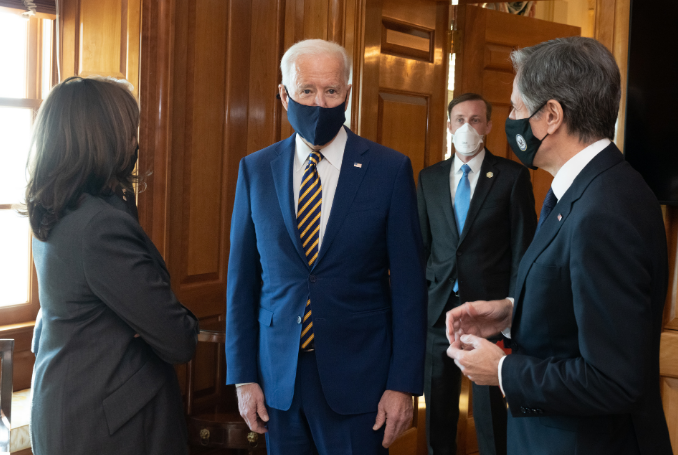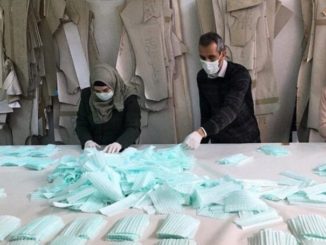
By Benay Blend
Every two years American voters begin searching for the perfect candidate who will return the country to its alleged former greatness. On the left, that means to its Democratic principles, on the right, it reflects a desire to return to the days when white men were the ruling majority and Empire was at its finest.
Sadly for the former, this country has always had the potential to fulfill its democratic goals, but instead was founded on the backs of enslaved men and women along with the extermination of the Native population to make way for imperialist expansion.
That desire to maintain an Empire has never faded, though since around 1900 expansionists have focused mostly overseas. For Palestinians and their supporters, this is common knowledge. In their world, presidential candidates are viewed with an eye to their position on Palestine.
According to the late activist/intellectual Ghassan Kanafani, Palestine is at the center of the anti-colonial struggle, both as a symbol of resistance and as a victim of Israel’s brutal colonial regime. As Louis Brehony notes, Kanafani was an “uncompromising internationalist” who wrote the following:
“The Palestinian cause is not a cause for Palestinians only, but a cause for every revolutionary… as a cause of the exploited and oppressed masses in our era.”
It follows that every anti-imperialist activist should hold true to that invective by judging those who aspire to office accordingly.
Perhaps Congress has shown more progress than sitting presidents and their aspirants. “Though the US remains a strong supporter of Israel,” Ramzy Baroud explains, “there are some indications that the supposed “unbreakable bond” with Tel Aviv is faltering, though more in terms of language than deeds.”
According to the US-Palestinian journalist, media consultant, an author, internationally-syndicated columnist, Editor of Palestine Chronicle, support for Israel is declining among Democratic Party members, there is some hope that Congress will pass several pieces of pending legislation aimed at weakening the most egregious elements of the Occupation.
So far, Biden, along with most of his contenders, remains in the Zionist camp. In an article during the lead up to the last election, Baroud summed up Biden’s commitment to the Zionist state “in his own words” and deeds. In these statements, Biden dredged all the time-honored positions plus he added a new one, a “moral obligation” to ensure that Israel remains a “secure and democratic friend.”
Biden has not caught up with other Democrats, who Baroud says have “shifted allegiances from Israel to Palestine.”
Among the 2023 presidential candidates, there are no voices that call for the liberation of Palestine. In a tweet four years ago, Marianne Williamson claims that it’s possible to criticize the behavior of Israel without “joining forces with those who seek to destroy it.” That conversation, she says, honors the human rights of Palestinians as well as the “legitimate security concerns of Israel.”
This perspective falls into the liberal Zionist playbook, calling Israel out when it goes too far, but does not call for the dismantling of the Zionist state. What she does not realize is that Palestinians will never gain human rights under the Occupation. Moreover, Williamson is comparing two imbalanced entities—the Occupied and the Occupier—as if they were the same.
The next contender, Robert F. Kennedy, Jr., sounds pretty much the same. Kennedy has drawn ire for his comments comparing the government’s support for the Covid vaccine to Nazis in Hitler’s Germany. In 2022, he told a crowd of supporters that “even in Hitler’s Germany, you could cross the Alps to Switzerland. You could hide in an attic like Anne Frank did.” Eventually, he apologized for using the word “holocaust” to describe children whom he believes were hurt by vaccines.
In response, the Auschwitz Memorial tweeted: “Exploiting of the tragedy of people who suffered, were humiliated, tortured & murdered by the totalitarian regime of Nazi Germany – including children like Anne Frank – in a debate about vaccines & limitations during a global pandemic is a sad symptom of moral & intellectual decay.”
Kennedy’s glossing over facts related to the Holocaust—Anne Frank died in a concentration camp as did millions of other people—appears, too, in his support of the Zionist Occupation. In a tweet he praised the musician Roger Waters because of his shared stance on the Covid vaccine and opposition to the Ukraine/Russian war. After he was told that Waters is a staunch supporter of Palestine, Kennedy deleted the tweet.
When questioned by the Grayzone’s Max Blumenthal about his position on this issue, he brought up his family’s long support for Israel, but threw in a comment about supporting the aspirations of the Palestinian people, too. Like Williamson, he does not understand that people under Occupation aspire to be free, but that cannot happen until the Zionist state is dismantled to make way for one secular state with equal rights for all.
Beyond the two parties, Cornel West, activist and public intellectual, recently announced that he is running for president as a candidate of the People’s Party. In 2021, he resigned from Harvard University’s Divinity School, citing the institution’s “deference to anti-Palestinian prejudices” as one of his reasons for doing so. He will most likely run an educational campaign, as third parties, with a few exceptions, have historically not done well against the major two.
The question remains, to those who have participated in the Palestine solidarity movement for years, how do voters support a candidate who campaigns on a platform of peace, but continues to support the fascist state of Israel?
If “justice is indivisible,” as Professor Abdulhadi contends, then how do politicians claim to promote social justice, but not for Palestinians? During the last elections, supporters of Biden claimed that he just needed to be educated, pushed to the left, but that could only be done after the elections because Trump had to be defeated at all costs.
In “Find Me Someone Better,” activist/writer Steven Salaita contends: “If leftists chose to participate, they should do it without making certain people disposable.”
US electoralism, Salaita states, ignores the “aspirations of communities whose freedom would disrupt imperial and colonial accumulation.” For example, when Kennedy and Williamson say that they support the Zionist state, but also the objectives of Palestinians, they fall within what Salaita calls the “culture of disposability,” i.e. relegating Palestinian needs to the periphery when it impedes electoral success.
After the chosen candidate gains power, the narrative continues, then Palestinians will gain their rights. There is no suggestion of how this is going to happen, except perhaps by pushing the official to the left (so far with Biden this hasn’t happened) and by educating him/her about the problem.
After gaining power, why would the candidate listen if there is nothing to be gained, particularly if the newly elected official is already looking forward to the next electoral process.
“When Palestinians express dismay about congressional aspirants or congresspeople who affirm ethnic cleansing (directly or implicitly), it’s hard to imagine a more vacuous, callous response than “you need to educate them!” Salaita writes. “It shifts the onus of moral negligence from elites articulating a fundamentally violent position onto the recipients of that violence.”
Given the lobbying efforts of JVP Action, AJP Action, and other groups dedicated to the Palestinian cause, its hard to believe that politicians are unaware. It recalls the phenomenon in Argentina during the Dirty War that Diana Taylor describes as “dangerous seeing,” such as neighbors disappearing off the street that no one claims to see (Disappearing Acts: Spectacles of Gender and Nationalism in Argentina’s “Dirty War,” 1997, p. 122).
On the one hand, how long are Palestinians required to wait in order to be seen? On the other, this question assumes that Palestinians have no agency, they are simply waiting around for a foreign savior to rescue them.
In reality, popular resistance has always been a part of Palestinian history, writes Baroud. During the height of the Great Return March in Gaza, he detailed what Palestinians could teach the world about resistance. “The people of Gaza rose up not because of Palestinian political factions, but despite them,” he explained, and that unity which arose during the weekly demonstrations is even stronger today.
In an interview with Aljazeera Net Arabic, Ayman Nofal, Commander of Military Relations and a member of the General Military Council of Hamas’s military arm, Qassam Brigades, explains that the unity of the Palestinian Resistance in Gaza takes form today in the “Joint Operations Room of Resistance Factions.” In this way, unity between Hamas and Fatah are not longer as important as the growing unification of armed resistance.
In 2018, Baroud related that the ongoing mass mobilization that grew that year is at its core “about reclaiming the agenda, transcending political infighting and giving voice back to the people.” This, he says, is the lesson to be learned from Palestinian resistance, an agenda that those in the West might heed: “And this time, we must listen,” he concludes, “quit lecturing, and perhaps learn from these young men and women as they stand bare-chested before snipers and murderers with only their chants for freedom and their faith in certain victory.”
Don’t ignore the major races, but remember that change almost always comes from below, the grassroots movements that have not sacrificed their connection to Palestine, along with other anti-colonial struggles, in order to advance their cause.

– Benay Blend earned her doctorate in American Studies from the University of New Mexico. Her scholarly works include Douglas Vakoch and Sam Mickey, Eds. (2017), “’Neither Homeland Nor Exile are Words’: ‘Situated Knowledge’ in the Works of Palestinian and Native American Writers”. She contributed this article to The Palestine Chronicle.







